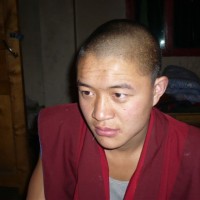The two Tibetans – Tenpa Dargey, 22, and Chimey Palden, 21, monks from the Tsodun Kirti monastery in Gyalrong – set themselves outside the prefectural government offices in Barkham on 30 March. Both Tenpa Dargey and Chimey Palden are from Kholachang village in Tsodun town, Barkham.
Both the monks had been taken to a government hospital immediately following the incident. Monks from Tsodun monastery rushed towards Barkham to take the two monks into their custody. But they were stopped 32 km from the monastery, at a place called Dzeto, by armed police and special police forces, who sent them back to the monastery. Their present condition remains unknown.
The Chinese government has imposed security blockade around the prefectural government headquarters by deploying a large number of special armed police.Tenpa Dargey studied philosphy at Kirti monastery in Ngaba from 2003-2009. While studying in Tsodun monastery, he was regarded as one of the best students in the
logical debate class. He was the youngest of four brothers and sisters.Chimey Palden joined Kirti monastery as a philosophy student in 2009, but stayed only for a few months. During a visit to Lhasa in 2010, he was arbitrarily detained by public security bureau for keeping His Holiness the Dalai Lama’s photo, the Tibetan national flag and a nationalist song in his mobile phone.
The Tsodun Kirti monastery is located 82 km from Barkham town. The formal name of the monastery is Ganden Tashi Choeling. The monastery has currently at least 300 monks. It is one of the largest Gelugpa monasteries in Gyalrong.
Since 2009, 34 Tibetans have set themselves on fire calling for freedom and His Holiness the Dalai Lama’s return to his homeland. 23 of these self-immolators have died, and others are either critically injured or remain unaccounted for. (Read Fact Sheet)
Reiterating the US government’s deep concern over the tense situation in Tibet, State Department Spokeperson Victoria Nuland on Wednesday said: “We remain deeply concerned about the tensions and the human rights violations in the Tibetan areas.”
“China’s own continuing vilification of the Dalai Lama and repeated accusations with regard to the Dalai Lama and saying that he’s directly involved adds to the Tibetan grievances and just makes the situation worse. So we continue to call on China to respect the human rights of Tibetans and to allow journalists in, et cetera,” Nuland said.


